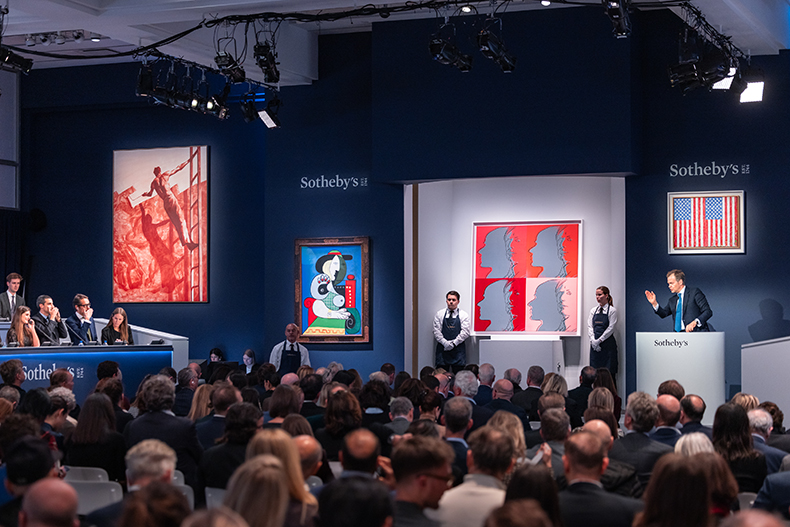The auction landscape doesn’t look magnificent at the end of 2023 – at least at the top end of the market. The November sales at Christie’s, Sotheby’s and Phillips in New York are normally the high points of the auction calendar. Instead, the totals just about arrived within spitting distance of the low estimates. Christie’s 21st Century Evening Sale made $107.5m (95 per cent of the low estimate), while Sotheby’s achieved $55.2m for its Now sale (just over the low estimate) and $250.5m for its Contemporary Evening Sale. This is secure enough for everyone to be able to say that the market hasn’t been seriously shaken – but not strong enough to drive the market on and up.
Despite what many auction specialists tell you, there’s no inherent reason the art market should keep on growing. Growth over recent years has been driven by Chinese collectors and, as shown by Sotheby’s sale of the collection of Liu Yiqian and Wang Wei, which brought in $69.9m against a low estimate of $73.3m, the region is under various pressures.
Certain commentators have taken this as the first sign that the strategy of focusing on single-owner collections isn’t working as well as it used to for the houses. I am not sure that’s entirely true. For every single-owner sale of the pedigree of the Brody (2010), Pincus (2012), Macklowe (2021) or Paul Allen (2022) collections, there has been a smaller one that hasn’t done all that well. But the purpose of collections for auction houses isn’t just to bring in the big bucks (of course, no auction house is interested in a sale that doesn’t make them money – but then, we don’t criticise lions for not being vegetarians). Collections also serve as a foundation on which to build the rest of the sale. Winning the individual big lots is much easier if an auction house can approach the consignor with a story about what else is happening in the same season. The problem with many of the collections in the November sales is that the stories just weren’t that good. Everyone wants to live like a Rockefeller; not so many people know how Emily Fisher Landau lived.
In the case of Fisher Landau, there is no denying the importance of her collecting. She assembled a magnificent collection, having bought works from many artists at an early stage in their careers, but there is always the problem of what makes it to auction. What’s for sale doesn’t always represent the full quality of the collection and that, naturally, affects the outcome. And none of the sales were good enough to trump the story of a market slow-down that had begun to establish itself.
There’s no doubt that the third-party guarantees carried the sales that took place in New York, so the rewards for these auctions will be minimal. There is also little doubt that at every downturn in the market auction houses look foolish with too many guarantees on the books. At least this time they’ve outsourced much of the financial burden to other groups rather than risk having been found carrying the can when the music stops.
If you need proof that the auction houses are committed to single-owner sales, just look at the auctions set to take place in early December. The gathering of sales under the banner of Classic Week – a name that both Christie’s and Sotheby’s has adopted – doesn’t include any particularly stand-out collections, with the exception of the Rembrandt etchings that were in the collection of Sam Josefowitz. There are slight differences between the two houses as to what is included in a ‘classic week’. Sotheby’s includes sales in Paris; Christie’s does not. But fundamentally, the effect is the same – to group together disparate things in a way that looks coherent. The point of this branding, which has been going on for about six years, is that it lends the auctions a sense of occasion and a storyline. It situates the lots vaguely in the history of collecting and adds lustre to the lower-priced lots. It does, that is, precisely what being part of an illustrious single-owner collection does. Far from being a tactic on its way out, selling works as part of single-owner collections might be the only tactic the auction houses have got.



